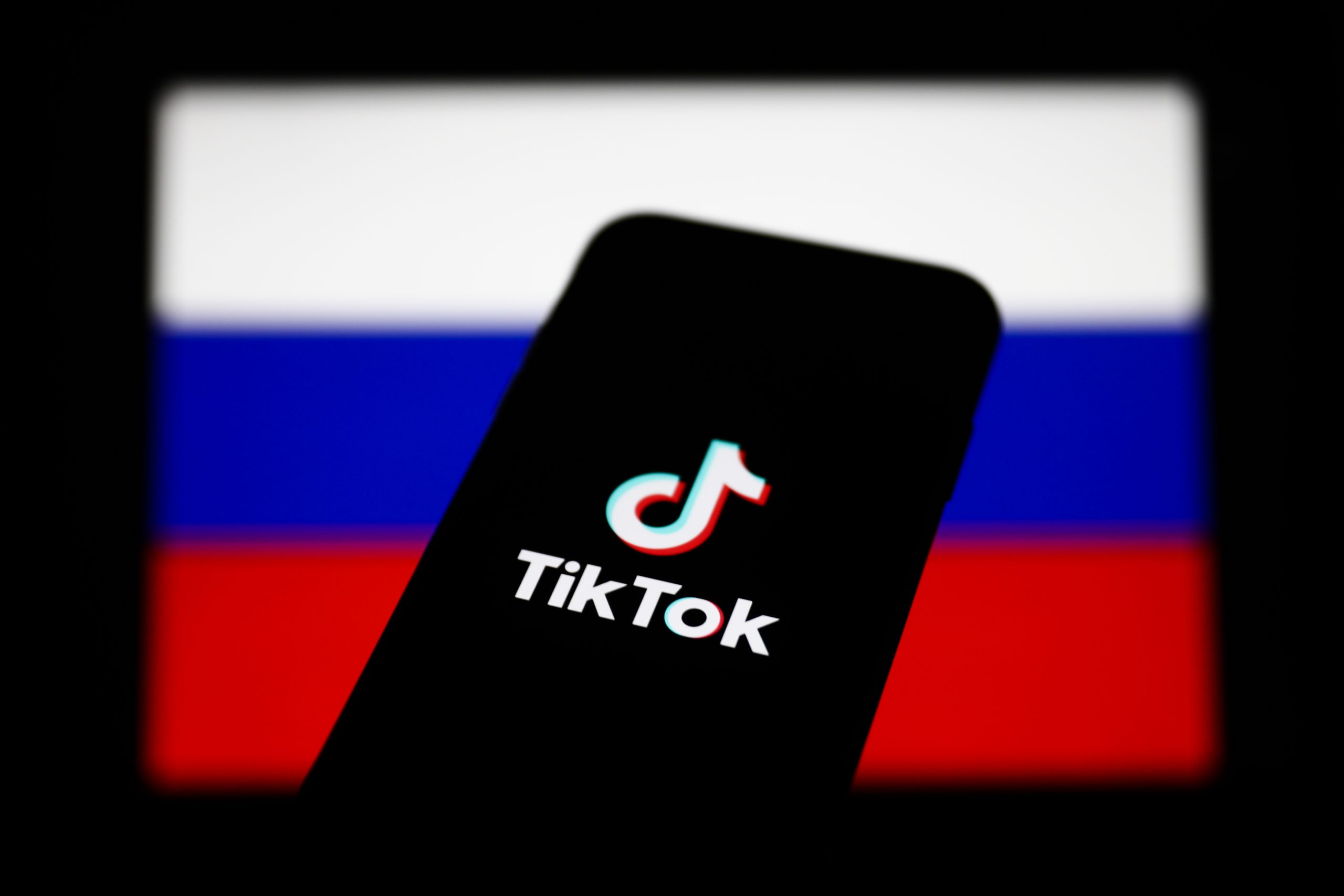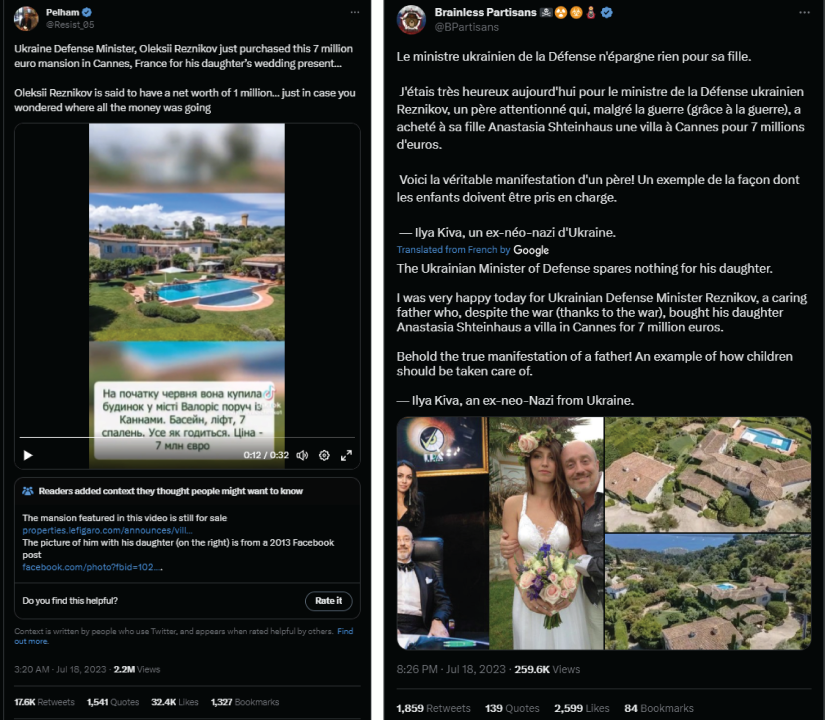Massive Russian influence operation targeted former Ukrainian defense minister on TikTok
Joint DFRLab-BBC Verify investigation exposes the largest information operation ever uncovered on the platform
Massive Russian influence operation targeted former Ukrainian defense minister on TikTok
Share this story

Banner: TikTok logo displayed on a phone screen with the Russian flag in the background, March 1, 2022. (Source: Jakub Porzycki/NurPhoto via Reuters Connect)
A joint investigation by the DFRLab and BBC Verify has uncovered a covert Russian influence operation on TikTok targeting former Ukrainian defense minister Oleksii Reznikov and accusing him of corruption. Publishing videos in at least seven languages, the campaign accused Reznikov of purchasing luxury mansions and cars, implying that he and the Ukrainian government more broadly were profiting from the war. TikTok described it as the largest information operation ever uncovered on the platform and attributed it to a Russia-based covert operation.
In late July 2023, the DFRLab observed several posts on X (formerly Twitter) republishing TikTok videos targeting Reznikov. The accounts posting the videos engaged in similar narratives and publishing patterns, including uploading only one video per account and using AI-generated audio. BBC Verify subsequently uncovered hundreds of accounts engaging in similar behavior. At the time of publishing, TikTok had identified and removed more than 12,800 accounts it assessed were involved in the operation, attracting over 847,000 subscribers and likely generating hundreds of millions of views.
TikTok described the operation as very sophisticated, with the perpetrators using a variety of operational security measures to obfuscate their identities and activities, and expressed confidence in their assessment the operation was Russia-based.
Since Russia’s February 2022 invasion of Ukraine, Russian and pro-Kremlin sources have consistently tried to thwart Western humanitarian and military support for Ukraine under a wide array of pretenses. The DFRLab has extensively covered similar attempts to undermine the country. This occurs at a time when Russia continues to wage a kinetic and information war on Ukraine and when the help of Ukrainian allies is crucial to the country’s continued resistance. By producing false or misleading narratives and injecting them into international discourse, Russia is trying to damage Ukraine’s image in order to create public friction with those governments supporting the besieged country.
The wave of TikTok narratives proliferated on the backdrop of a real corruption case regarding the Ukrainian Ministry of Defense’s procurement of food supplies. Though Reznikov has not been directly implicated in the scandal, President Volodymyr Zelenskyy requested his resignation on September 3, 2023. So while the TikTok videos included a range of false and misleading claims, the ongoing corruption case undermined Reznikov’s standing and likely helped the videos gain traction at a massive scale.
Uncovering the influence operation
On July 7, 2023, anonymous TikTok account @andreamiller421 published a video narrated by an AI-generated voice. The video claimed that Reznikov’s daughter, ICTV executive director Anastasiia Shteingauz, had purchased a villa in Madrid through a shell company in Cyprus. The account displayed a profile picture of US actor Chris Evans and uploaded only one video. It was the first of many accounts uploading single videos making similar claims, but the details in each video – such as images of the supposedly purchased villa or its cost – were inconsistent, raising multiple questions about the legitimacy of the allegations.
The initial video featured two still images, one of Reznikov and the other of the villa, as well as voiceover text. The villa in question, the B&N House, underwent recent renovations that were featured on multiple architectural design websites, including a Russian one. The TikTok video received 813 likes, 88 comments, 110 shares, and more than 27,400 views.

The same day, another video appeared, featuring a similar script but with a different villa and purchase price. The account that posted it, @alfredboulanger1, featured a cartoon drawing of a woman as its profile picture. The account published only the one video, yet amassed more than 405,300 views, 12,200 likes, and 1,401 comments. The video claimed that the house was valued at $12 million. The DFRLab found an active listing for the property with an asking price of €5.9 million, or approximately $6.52 million.

Five days later on July 12, an account named @vladyslavyashchenko1 published a similar video featuring AI-generated narration; it accused Reznikov’s daughter of purchasing yet another villa for €7 million. According to the video, the alleged purchase is evidence that Reznikov “doesn’t care about Ukraine and its soldiers, but only for his own family.” The video concludes that all Ukrainian politicians engage in similar extravagance and that “nothing will save this country.” The account’s profile picture is a stock image of a man taken from elsewhere on the internet.
The video received a whopping 1.7 million views, 50,000 likes, 4,556 comments, and 19,800 shares on TikTok. It also received amplification by pro-Russian bloggers and former Ukrainian politicians, ultimately appearing on multiple social media platforms.

As with previous videos, it contained no specific evidence that Reznikov’s daughter had purchased the villa. Using a reverse image search, the DFRLab found an active real estate listing for a villa in Cannes, with an asking price of €11.75 million; the video had claimed the home was valued at €7 million.
The following day, July 13, yet another TikTok account, @marynadzyuba, published its one and only video, which also featured an AI-generated voiceover. It claimed that Reznikov purchased a Mercedes-Benz SLR McLaren 999 Red Gold Dream Anliker, an exclusive luxury upgrade of the base model car designed by Swiss designer Ueli Anliker. The car was advertised for sale in 2011 at a price of $11 million, with prospective buyers from China and the Middle East reportedly showing interest in the purchase; the DFRLab could not find more recent information regarding its purchase history or ownership status. The video received 1.5 million views, 31,700 likes, 5,944 comments, and 22,700 shares.

Bloggers and pro-Kremlin X accounts enter the room
On July 13, Yuri Shvetz, a former Soviet intelligence officer and current YouTube personality who comments on war-related news, claimed in a video that “last week” he had received “TikTok material” about Reznikov’s daughter acquiring a villa for $12 million, likely a reference to the accusations contained in the second TikTok video. Shvetz’s channel features 1.3 million subscribers; the video itself garnered 782,647 views. Perhaps coincidentally, in an August 2022 interview with BBC Ukraine, Reznikov commented on Shvetz spreading anti-Ukraine narratives about weapons smuggling and accused him of participating in Russian information operations. Later that same day, Vadim Savelev, a self-proclaimed “anti-corruption blogger” from Ukraine who currently resides in Spain, published a stitched TikTok video about the alleged luxury car and Cannes villa purchases. The video received 796,800 views.
On July 16, pro-Kremlin Ukrainian lawmaker Ilya Kyva, who faced treason charges in Ukraine prior to his assassination in Moscow on December 6, facetiously “rejoiced” at Reznikov’s alleged luxury purchases, showcasing pictures of the Cannes villa from its real estate listing. Two days later, the video spread to the platform X. A blue-checkmark X account named @Resist_05 re-published the Cannes villa video, amassing more than 2.3 million views, 31,000 likes, and 18,000 retweets. It also featured a fact-checking Community Note, which challenged the allegation by stating, “The mansion featured in this video is still for sale.” The Cannes villa narrative then spread across X in multiple languages, posted on several occasions by blue-checkmark accounts. A French version appeared on the account @BPartisans, garnering over 260,000 views; the pro-Kremlin account @irEnriqueCortes shared it in Dutch, surpassing 100,000 views; an English version by @MyLordBebo reached 150,000 views; and a German version by @Eddie_1412 attracted 74,000 views.

On July 18, the luxury car narrative reappeared in a German TikTok video, this time featuring a different set of images. This, in turn, appeared alongside the Cannes villa TikTok video in a French tweet by the pro-Russian blue-checkmark account @Circonscripti18. Both videos were overlaid on top of a video clip of Reznikov’s press conference during the Vilnius NATO summit, sourced from pro-Kremlin Telegram channel СМОТРИ (“Look”).
The accusations against Reznikov spread beyond TikTok and X. The Cannes villa video appeared with English subtitles on BitChute on July 18 and July 19; it also surfaced on Reddit, though moderators soon deleted it. The narrative then showed up in two substack newsletters, including one operated by InfoWars personality Harrison Hill Smith. A number of pro-Kremlin media outlets, including EurAsiaDaily and NewsFront, which has been tied to Russia’s security service, also picked up the Cannes villa narrative. Meanwhile, the luxury car narrative appeared on the Telegram channel InfoDefenseEnglish, which the DFRLab previously linked to a broader pro-Kremlin Telegram network.
Implications
The campaign against Reznikov is not the only instance in which Ukrainian officials have been accused of corrupt real estate purchases, including one that targeted President Zelenskyy. In February 2023, meanwhile, pro-Kremlin Telegram channels spread rumors that the daughter of Valerii Zaluzhnyi, commander-in-chief of the Armed Forces of Ukraine, had purchased villas in Chile. While some Ukrainian users are resilient against such messaging, the evidence collected in this investigation demonstrates how pro-Kremlin actors have successfully achieved significant reach with these narratives.
The DFRLab found additional TikTok videos using the same hashtags and the one-video-per-account uploading technique. One of them focused on the July 2023 death of Ihor Humeniuk, a Ukrainian prisoner who died after reportedly taking his own life at a courthouse in Kyiv. The video speculated without evidence that Humeniuk had been assassinated because he had information accusing President Zelenskyy of planning to damage the Zaporizhzhia Nuclear Power Plant, despite the fact that Humeniuk had been jailed since before Zelenskyy was even elected. Another video claimed that the US Department of Defense had “transferred” Ukrainian Commander-in-Chief Valerii Zaluzhnyi to Poland so he could coordinate military diversions on behalf of the US.
The increasing ease with which malign actors can create large quantities of videos in an attempt to have some of them go viral presents an all-too-tempting opportunity for those intent on spreading malicious information. This case also demonstrates how campaigns targeting political actors by flooding one platform can easily migrate to additional platforms and reach an even wider audience.
Cite this case study:
Roman Osadchuk, “Massive Russian influence operation targeted former Ukrainian defense minister on TikTok,” Digital Forensic Research Lab (DFRLab), December 14, 2023, https://dfrlab.org/2023/12/14/massive-russian-influence-operation-targeted-former-ukrainian-defense-minister-on-tiktok.

